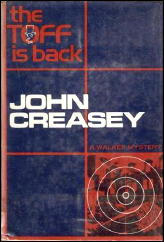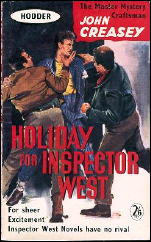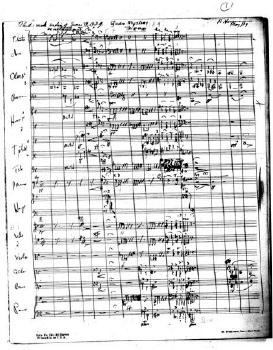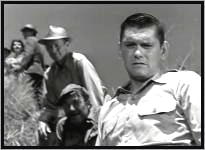Wed 1 Sep 2010
Mike Nevins on JOHN CREASEY, The Toff, Inspector West, ELLERY QUEEN and BERNARD HERRMANN.
Posted by Steve under Authors , Columns , Old Time Radio[10] Comments
by Francis M. Nevins
During World War II John Creasey wrote dozens of thrillers set in London that were never published outside the UK — until decades later when, as a superstar of the genre, he revised them for US publication, cutting out all the vivid wartime atmosphere that made them special.

Recently I picked up The Toff Is Back — first published in 1942 and, according to the copyright page, revised in 1971, two years before Creasey’s death — and found to my surprise that all the ambiance of a largely bombed-out London survived the revision intact.
The Hon. Richard Rollison, a.k.a. The Toff, returns from military service in North Africa to find that a well-organized gang has been looting bombed jewelry shops on a grand scale and framing innocent residents of his beloved East End for their crimes.
Over the years I’ve read, or rather tried to read, several revised Creaseys alongside the 1940s versions, and every time found the originals infinitely better. I’ve never seen the wartime version of this one but it reads as if it hasn’t been revised at all, for which I shout Hallelujah.
In fact, even the occasional gaffes which are inevitable when a book is written at the rate of 10,000 words a day seem to have been preserved. The racket boss is named Barte Lee while other characters live in Bartley Square, and on page 54 we read “Very slowly and deliberately Lee leaned forward,†which reminded me of the hilarious “Everywhere a Lee Lee†song from 1776.
Gaffes and all, I highly recommend this one to any reader who wants to be taken back, like viewers of the early seasons of the Foyle’s War series, to a London being nightly pulverized by Hitler’s Luftwaffe.
Anyone who would like to sample Creasey’s unretouched WWII thrillers without hitting used book shops has a golden opportunity in store. His first five Roger West novels, originally published between 1942 and 1946, will be reprinted a few months from now by Battered Silicon Dispatch Box, the Canada-based publishing operation owned by George Vanderburgh, as the omnibus volume Inspector West Goes to War.
I’ve written an introduction for the book and have just finished proofreading the computer-scanned texts of those novels. It was a tedious task with two capital T’s but there’s no other way I could have learned so much about the stylistic oddities of these chronicles of London during and immediately after the war.

Quirks and all, the early West novels are still amazingly readable today. Unlike any other Scotland Yard series I can recall, these books are packed with vivid action scenes. One might almost be reading a series of old-time Westerns except for the fact that guns are sparingly used, both by the bad guys and the bobbies.
Pounding out those ten thousand words a day, Creasey couldn’t avoid perpetrating some Avalloneisms, but far fewer than in the works of the grand master of malapropisms, Mike Avallone himself.
One I found while proofreading is worth preserving. In Chapter 11 of Holiday for Inspector West (1946) Roger questions a female suspect and then her father, of whom Creasey says: “Like his daughter he had become a changed man.â€
As editor of this five-volume omnibus I’ve decided to substitute “person†for the last word of that sentence.
Blatant mistakes of this sort, grammar-wise, usage-wise or otherwise, are being corrected, but I am not Americanizing any British terms: those four rubber doughnuts that are found on motor vehicles are called tyres, and when a car has engine trouble, the driver pulls into the kerb and looks under the bonnet.
What you will read in Inspector West Goes to War is (except for those blatant slips) precisely what Creasey wrote at white heat as that war was raging and immediately afterward.
Between late June and late August 1939, during the first ten weeks that the 60-minute Adventures of Ellery Queen radio series was broadcast on CBS, each episode featured original background music composed and conducted by the soon to be famous Bernard Herrmann.
None of those episodes survive, and the last time anyone heard what Herrmann wrote for the EQ series was 71 years ago. But today, thanks to the wonderworld of the Web, you can see some of the pages of Herrmann’s score on your computer screen:

First, go to the Bernard Herrmann Society website. Click on “Talking Herrmann.†Enter the box at the bottom of the first page and, among the options given, click on “Topics for the Last Year.†Near the bottom of the fourth page is a thread entitled “Adventures of Ellery Queen 1939.†[This link, if it holds up over time, should take you there directly.]
There lies the treasure, allowing those who can read a score and have an appropriate instrument to play some of Herrmann’s EQ music in their own homes.
I wish I were one of that number. When I was a child my mother tried to make a pianist out of me but I resisted and today, sixty years later, I can’t read a note. Damn!
The second and final Herrmann-Queen interface took place almost a quarter century later. Among the episodes of the second season of The Alfred Hitchcock Hour on CBS-TV was “Terror in Northfield†(October 11, 1963), based on Queen’s 1956 non-series novelette about a string of violent deaths on the exact same spot. [Hulu link.]

Harvey Hart directed from an adaptation by Leigh Brackett that dropped most of the detection in the Queen tale and stressed suspense. The puzzled deputy sheriff, the menaced local librarian and the mad farmer were played respectively by Dick York, Jacqueline Scott and R.G. Armstrong.
Herrmann composed the score for this and several other Hitchcock Hour segments as well. May I still be alive and the owner of a decent pair of ears on the day when his scores for that series and others of the same period, like The Richard Boone Show and The Virginian, become available on CD.
September 1st, 2010 at 8:52 pm
THE TOFF GOES TO MARKET is another wartime adventure with a bombed out London setting dealing with the Black Market when Rollinson’s Aunt Glory nearly dies after consuming some contaminated food and Rolly takes time off from his wartime intelligence job to enlist Bill Ebbutt and his East End pals to smash the Black Market.
I don’t know about the revision of that one as my copy is a first. I loved the wartime West novels, for all the incidences of too fast writing in Creasey (he almost never revised a novel at the time it was written)he had tremendous energy and invention and reading them is great fun.
Anything that exposes me to more Herrmann scores is a good thing in my estimation. The man was born to do suspense film scores, and I always think how much I’d like to kick the moron who convinced Hitchcock Herrmann was old fashioned and deprived us of his scores for the last few films of the master.
September 1st, 2010 at 9:10 pm
Prof. Nevins, would it be possible for you to post here when “Inspector West Goes To War” is available to order at the Battered Silicon Dispatch Bag site?
I hope there is.
I had hoped there was a way to pre-order at the site, but if so I couldn’t find it.
(It sounds like an excellent introduction to Creasey.)
September 1st, 2010 at 9:38 pm
I don’t think BSDB does pre-orders. George’s schedules are never hard and fast, but when the books come out, they’re handsome editions, indeed.
I’ve asked Mike and while he hasn’t gotten back to me yet, I think these are the five Roger West novels that are in the book. They fit his description well enough:
# Inspector West Takes Charge (n.) Paul 1942 [London]
# Inspector West Leaves Town (n.) Paul 1943 [England]
# Inspector West at Home (n.) Paul 1944 [London]
# Inspector West Regrets (n.) Paul 1945 [London]
# Holiday for Inspector West (n.) Paul 1946 [London]
September 1st, 2010 at 10:23 pm
The West books took a back seat later to the Gideon titles, and critics were hell on Creasey about the family stuff and West’s sons Richard and Martin (the same names as Creasey’s sons and his private eyes Richard and Martin Fane), but I always thought West was the best of the Edgar Wallace inspired cops, and there are some notable books in the series.
Aside from what appears to be the five in the BSDB omnibus I would whole heartedly recommend THE GELIGNITE GANG, SO YOUNG SO COLD SO DEAD, THE THEFT OF THE MAGNA CARTA, THE EXECUTIONERS, MURDER ON THE LINE (an excellent use of the British industrial rail service as a background), VENDETTA FOR INSPECTOR WEST, THE CASE AGAINST PAUL RAEBURN, DEATH OF A POSTMAN, and GUN FOR INPECTOR WEST. The series within a series MURDER LONDON/NEW YORK, … LONDON/MIAMI etc are worth reading too.
September 2nd, 2010 at 12:00 pm
Dear Steve:
The column looks great as always. You were correct in naming the five books that will make up Inspector West Goes to War and I’ll make sure to let you know when the book comes out.
I have The Toff Goes to Market in its original form and wrote about it for you a few years ago:
https://mysteryfile.com/nevins_606.html
That’s the one where the brains heavy is named Barbicue.
Mike
September 3rd, 2010 at 1:43 pm
Sorry about this, Mike …
The Alfred Hitchcock Hour aired on CBS during its second season, Fridays at 10 (9 Central), right after Twilight Zone.
The best weekend kickoff in all my grade-school years.
That aside, terrific column, as always.
September 3rd, 2010 at 4:40 pm
Steve,
Do you remember the little discussion we had here about this Toff book in May 2008? It was prompted by comment made on wartime Britain in mystery fiction in a review of David Frome’s Homicide House. Readers might like to look it up via your handy Search box.
September 3rd, 2010 at 4:46 pm
Mike the Lowbrow Crank
I’ve fixed the error regarding CBS (not NBC).
When Mike Nevins and I caught a previous error — he originally stated this episode appeared in the third season — we corrected it to the second season, not remembering that the ALFRED HITCHCOCK HOUR changed networks between the second and third.
Anyway that’s how this particular goof got by us. Thanks for catching it!
— Steve
September 3rd, 2010 at 4:58 pm
Chap
Your memory is better than mine. I knew that we’d talked about British mysteries taking place in wartime England — and under wartime conditions — but I’d forgotten where and how it had come up, nor when either.
So thanks for the reminder. Here’s a direct link to that Leslie Ford review, along with the comments:
https://mysteryfile.com/blog/?p=600#comments
— Steve
December 1st, 2015 at 1:58 pm
My favourite John Creasey books were his Gideon of Scotland Yard stoeris.He wrote them under the pseudonym of J J Marric. The last one appeared in 1976 & then the Gideon mantle was picked up by William Vivian Butler (1927-87)who wrote 6 more Gideon stoeris which continued the life of George Gideon & his wife & 6 children. The stoeris appeared from 1978 to 1990 and the last one was published posthumously. I used to enjoy borrowing them from libraries but like Dennis Wheatley yarns they appear to have lost popularity and are presumably out-of-print as well.